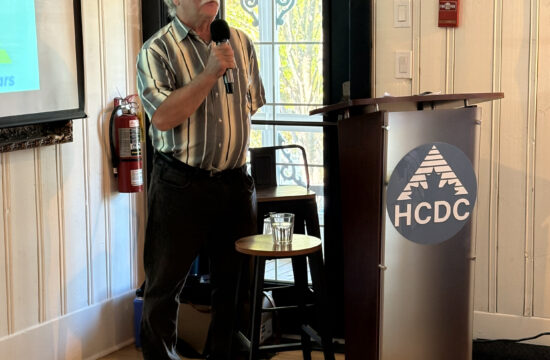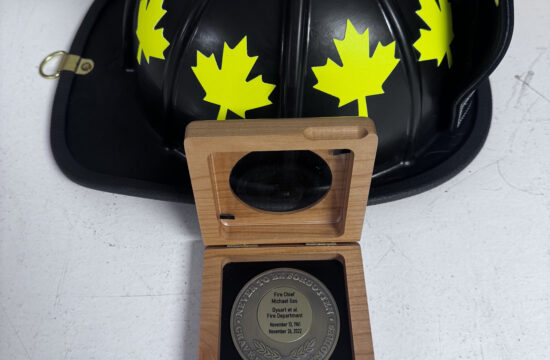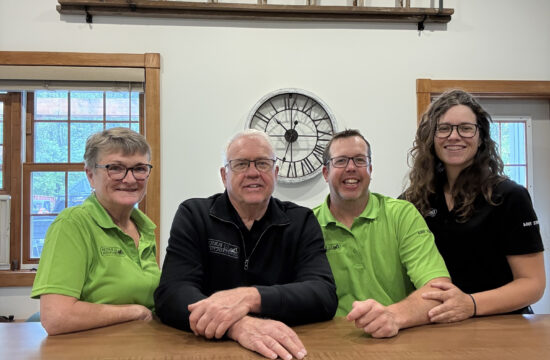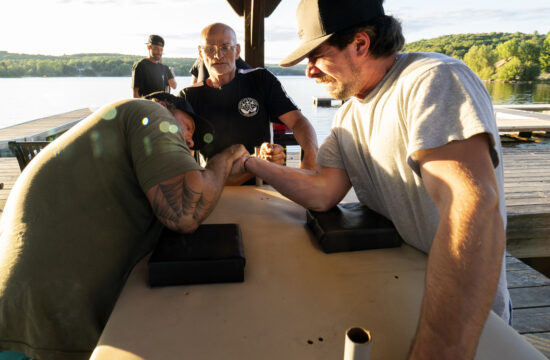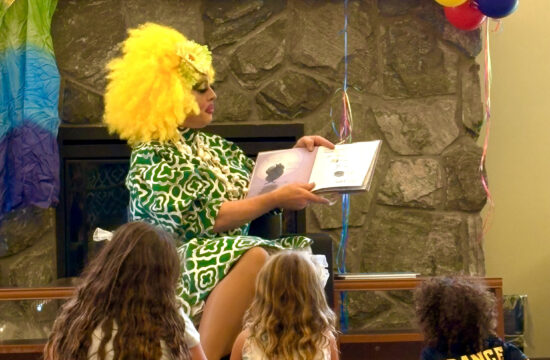By Emily Stonehouse
There are few things that stress out a journalist.
We’re no stranger to deadlines and breaking news. We thrive under pressure, and are masters at putting on a happy face, even after the drudges of a long day.
But being tasked with covering the work of another journalist; that’s a stressor.
And not just any journalist. A well-known Canadian icon.
Steve Paikin has been a writer and reporter for news agencies such as CBC and TVO. He is an author, a television host, and the moderator for a number of past debates at federal and provincial levels.
Nearly every Canadian knows his name.
And on June 12, his popularity became apparent in Haliburton County.
Paikin was invited to conclude this season’s stacked lineup of the Telling Our Stories Speaker Series; a monthly event that draws crowds from across the county, eager to hear about a variety of eclectic topics brought to the table.
Normally, the events are hosted at the Fish Hatchery. But for this one, the organizers needed to bump up capacity. “This has been our most popular event so far,” said Barrie Martin, one of the founding members of the Speakers Series. “It’s great to see.”
The event was shuffled to the ballroom at the Pinestone, often used for weddings and proms, the venue had filled the space with rows and rows of banquet chairs.
And every single one was filled. On two occasions, Pinestone staff were seen heading to the storage closets, hauling additional flats of stacked seats out onto the floor; hurriedly trying to keep up with demand.
And at the front of the room, stood a single microphone and a glass of water.
Often, these events include slide decks and projectors. Props and instruments.
But when Paikin came to the stage, he crossed his sneakered feet, and had had the audience hooked from his first words. “It’s great to see so many of you,” he said. “For the next little while, I’d like to take you back, on a journey.”
Paikin was there to discuss his new book: The Man Behind the Myth: An Intimate Biography of John Turner. Not everyone would recognize the name of Canada’s 17th Prime Minister. To others, he’s a legend.
He held the title of Prime Minister for a mere 79 days.
But that wasn’t all that put him on the map. In his book, Paikin set out to change the myth around the idea that Turner was “born with a silver spoon in his mouth.”
In reality, his early days were wrought with tragedy, with his father dying from sudden complications on the surgery table, and his mother losing an infant child in their native country of England.
As their lives crashed around them, Turner’s mother sought solace in her home province of British Columbia. Here, she took it upon herself to write to the Prime Minister of Canada at the time, R.B. Bennett, stating that she would like a job.
And, in a stark contrast to the happenings of the modern world, she gets a reply from Bennett, encouraging her to come to Ottawa so they can meet. She brings Turner and his sister to the nation’s capital, where she becomes the highest ranking female civil servant of the day. A fighter in her blood.
“People think that Turner’s story started in Ottawa,” said Paikin. “But they seem to forget the tragedy that came before.”
Paikin went on to share the trajectory of Turner’s career in politics: a Member of Parliament at the age of 33, the Minister of Consumer and Commercial Affairs, his loss at the 1968 leadership convention, where he was snubbed out by half a percentage in the votes to none other than Pierre Elliot Trudeau.
But upon his leadership loss to Trudeau Sr., he was appointed as Minister of Justice to his cabinet, where, as Paikin noted, “three big things happened.”
Turner streamlined and simplified the divorce process, which previously required couples to petition to parliament with the acknowledgement of infidelity or abuse. Next, he legalized abortion. Not only that, but he provided access for safe, therapeutic abortions for those in need. Paikin noted that this was revolutionary, as Turner was a staunch and devout Catholic. But he recognized the need for safety and protection of women’s rights, and put that priority on the forefront.
Lastly, he navigated the October Crisis of 1970, warranting 24-hour protection during the national turmoil. “The attention of the country was very focused,” said Paikin.
After his stint as the Minister of Justice, Turner changed gears to become the Minister of Finance, and lead the country out of a recession, and into a time of relative peace and stability economically.
But by 1975, the relationship between Turner and Trudeau began to sour, resulting in Turner resigning from the role. He spent the next decade in the private sector, wracking up cash and avoiding political confrontations.
In 1984, Pierre Trudeau took a very famous walk in the snow, and made the decision to resign as Prime Minister, so Turner once again threw his hat in the ring for the leadership role. He beat out future PM Jean Chrétien in the process.
And in a situation very similar to current Prime Minister Mark Carney assuming the role recently, Turner became Canada’s 17th Prime Minister.
But Paikin noted that Turner was rusty. His French had waned, he was out of practice from a picketing and fundraising standpoint, and he didn’t have the same popularity that kept him afloat all those years ago. As soon as he was sworn in, Turner called a snap election. “All these years later,” reflected Paikin, “and I still don’t know why he did that.”
Between the Liberal Patronage scandal and Turner’s disconnect from the everyday people of the country, he didn’t stand a chance against Brian Mulroney, who won the largest majority government in Canadian history that year.
Turner tried again in 1988, and brought the polls closer with the free trade debate that hovered around the Canada/U.S. relationship (sound familiar?), but ultimately lost as the result of a smear campaign from the Conservatives, resulting in the second majority government for Mulroney; a feat that hadn’t taken place since the Conservative days of John A. Macdonald.
Turner was done. Chrétien stepped in as the leader of the Liberal party, and Turner sunk into a depression. It wasn’t until he contacted an old friend, who redirected him to a life of advocacy and education. “For his final act of life, he chose to champion the importance of young people running for office,” said Paikin. “That became his mission for the rest of his life.”
The lifelong politician traveled all over the country, speaking to everyone and anyone he could, about the value of democracy, and the role of politics in modern society. “He would say, ‘democracy doesn’t happen by itself, we need to participate,’” shared Paikin, referencing a favourite Turner line.
Despite having a binder dedicated to his funeral plans, Turner unfortunately died during the peak of the COVID-19 pandemic, resulting in a small funeral for the larger-than-life personality. Paikin noted that despite all the ins and outs of Turner’s life, all the highs and lows and ups and downs, this was the part that made him the saddest. “He deserved a lot more than what he got at the end,” he said.
Paikin concluded the night with questions and answers from the crowd; some of which were in reference to his book, with others hovering around the future of public television, and the current political climate. He answered each question with ease, kindness, and a touch of humour.
There was a warm, palpable energy to the room. There’s something to be said about a space where hundreds can gather around the topic of politics, without getting political. Surely there were varying ideologies, beliefs, and priorities in that room. But those never came to the surface. Instead, it was a celebration of the past, and an optimism for the future political landscape; with people who care in their corners.
“You really are the epitome of what a great Canadian should be,” said one attendee, as the sky began to darken outside and drinks were reaching the bottom of their glasses.
And thank goodness for that.
Because if there’s one thing that stresses out journalists, it’s covering the work of another journalist.






